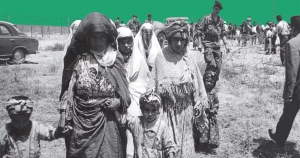Martin Thomas
Clinton Fernandes reviews ‘The End of Empires and a World Remade: A global history of decolonization’ by Martin Thomas
The End of Empires and a World Remade is Martin Thomas’s magnum opus. Subtitled ‘A global history of decolonisation’, it is more than 600 pages long, of which nearly 300 pages consist of Notes and Bibliography covering more than 2,000 articles and books. The overwhelming majority of these were published in the twenty-first century – an indication of the burgeoning academic interest in decolonisation.
... (read more)Michael Hanrahan reviews 'The Government in Exile' by Paul Collins, 'The Comfort Women: Sex slaves of the Japanese Imperial forces' by George Hicks, 'The Roan' by Martin Thomas, and 'Walking on Water: Sydney Theatre Company at the Wharf'
Australia is not the science-fiction capital of the world; in fact we are probably not even on the map. This unfortunate fact would change if we could produce more writers like Paul Collins.
... (read more)Patrick White, winner of the Nobel Prize for Literature in 1973, has long been considered Australia’s finest novelist. And yet, the thirtieth anniversary of his death in 2020 passed by with barely a murmur. Was this merely a consequence of the pandemic, or are there larger cultural forces at play? In today's episode, historian and ABR Calibre prize-winning essayist Martin Thomas considers the posthumous neglect of the great Australian writer, who once described himself as a ‘Londoner at heart’ and who continues to challenge jingoistic and complacent forms of nationalism.
... (read more)‘Your sense of permanence is perverted,’ said Holstius to Theodora Goodman in The Aunt’s Story (1948). ‘True permanence is a state of multiplication and division.’ The words are prescient, for Patrick White, who wrote them, has done rather well at dissolving into the impermanence of post-mortem obscurity. Perhaps unsurprisingly in view of the pandemic, the thirtieth anniversary of his death in 2020 left little imprint. No literary festival honoured the occasion, and no journal did a special issue. If White is looking down at us from some gumtree in the sky, he will be bathing in the lack of glory. He despised the hacks of the ‘Oz Lit’ industry as much as he loathed the ‘academic turds from Canberra’.
... (read more)To complement our coverage of new books on the subject, we invited a number of writers, scholars, and environmentalists to nominate the books that have had the greatest effect on them from an environmental point of view.
... (read more)#1 Martin Thomas reads ‘“Because it’s your country”: Bringing Back the Bones to West Arnhem Land'
Monday, 21 December 2015In 2013 we published Martin Thomas's Calibre Prize-winning essay ‘“Because it’s your country”: Bringing Back the Bones to West Arnhem Land'. This powerful story of the repatriation of Aboriginal bones soon became the best read article on our website and we are delighted to be able to launch the ABR podcast with it.
... (read more)Jennifer Maiden's The Fox Petition: New Poems (Giramondo) conjures foxes 'whose eyes were ghosts with pity' and foxes of language that transform the world's headlines
... (read more)Martin Thomas reviews 'Battarbee and Namatjira' by Martin Edmond
There was something of the alchemist in Albert Namatjira. Using the most liquescent of media, he created impressions of the driest terrain. Painting in watercolour involves the fluid dispersal of pigment. Yet in Namatjira we find colours distilled in such a way that each landscape glows with a quiet intensity. This evocation of light reveals the influence of Rex Battarbee, who, long before he began to tutor his famous protégé, voiced dissatisfaction with ‘traditional methods’. He developed a painting technique of his own, specifically designed to ‘achieve luminosity’. Like many an inventor, he was cautious about sharing his discovery, in part because he believed that artists should develop on their own terms. But Namatjira was so keen an observer of his then master that he would have realised if Battarbee had withheld information. So Rex decided to teach him everything he knew, both for the sake of Namatjira, whom he clearly adored, and more generally and altruistically ‘for the sake of the Aborigines’.
... (read more)Books of the Year is always one our most popular features. Find out what our 41 contributors liked most this year – and why.
... (read more)Martin Thomas reviews 'Where is Dr Leichhardt?' by Darrell Lewis
Among all the myriad characters, brilliant and brutish, fraudulent and fabulous, who lobbed into New South Wales in the mid-nineteenth century, Ludwig Leichhardt, born in rural Prussia 200 years ago, was in a class of his own.
... (read more)



